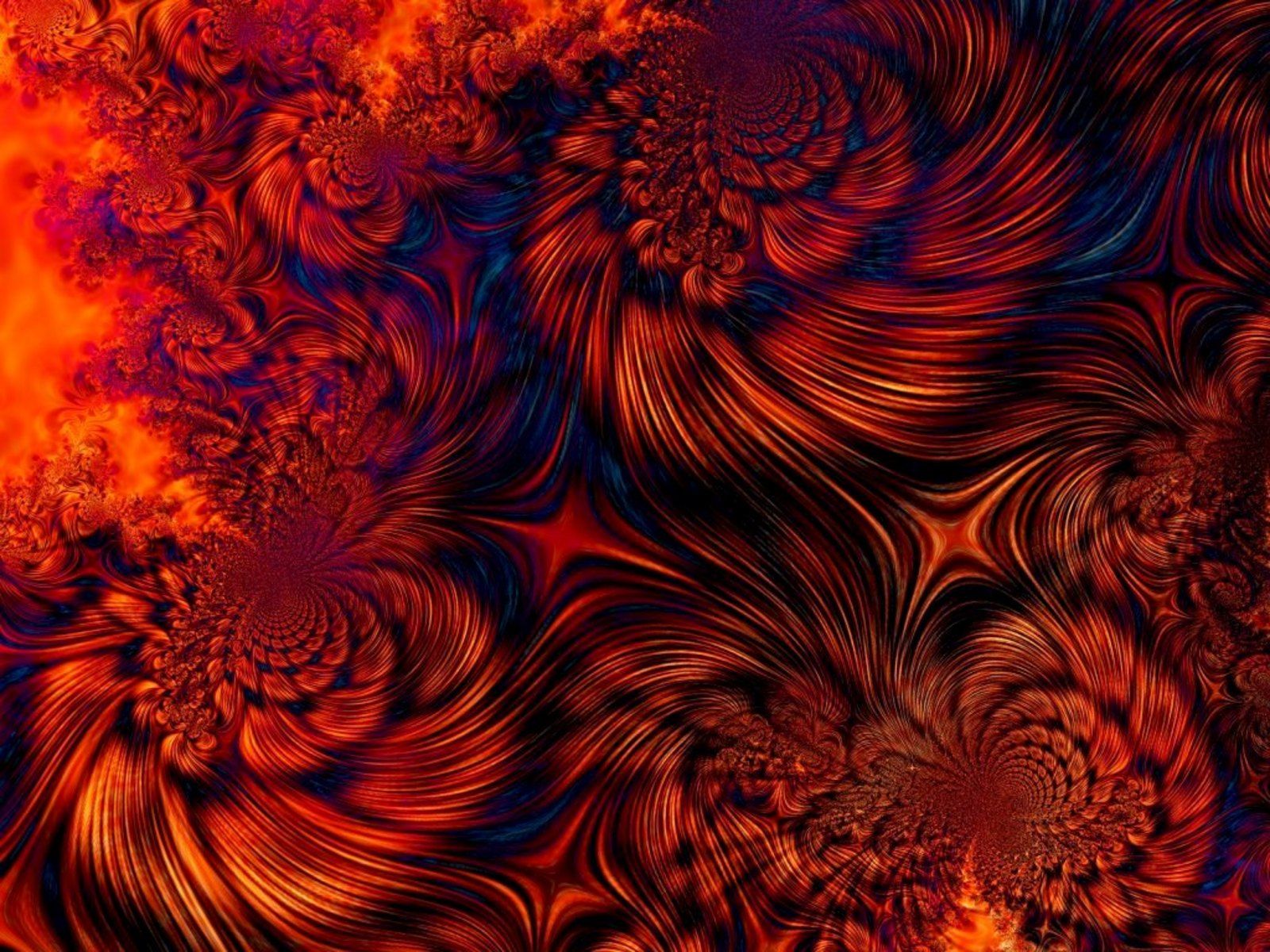1.- Muladhara Chakra, where the serpentine and powerful Kundalini resides
1.1- The awakening of Muladhara Chakra?
The activation of Muladhara Chakra is very important, first, because it is the seat of Kundalini, and second, because heavy energies (Tamas) also reside that make it impossible for us to evolve.
Many life experiences and intense emotional imprints are stored in Muladhara: unfortunately also guilt, complexes and every agony suffered in our lives have their foundations in this Chakra.
It is very important for any human being to awaken the beneficial aspects of Muladhara, and acquire the ability to come out of the vegetative state that comes from the disharmony of this center of power. Our dreams, desires and achievements are controlled by the lower Chakras; and whatever action we undertake in life is an expression of Muladhara.

Our lower Karmas and Samskaras are stored there and, as in previous incarnations, our personality has its foundations in the sexual entity: everyday objects, friends, housing, etc., are influenced by our subconscious desires.
1.2- Etymology of the first Chakra Muladhara
1.2.1- Sanskrit root and recommendation for the Muladhara Chakra
The Sanskrit word Muladhara means “Support and Rooting”. Mūlādhāra, is made up of two words: mūla meaning ‘root’, and ādhāra meaning ‘support’.
For the activation of the first Chakra we recommend the use of a suitable incense, as an example this natural incense from Goloka of the first Chakra.
The word Mula comes from the Sanskrit root meaning “root” and Ádhara meaning “support”.
2.- Location and element of the first Chakra Muladhara
In men, the Muladhara is physically located inside the perineum, between the scrotum and the anus. In women we find it in the cervix.
The Muladhara Chakra belongs to the Earth element. Tantra does not refer to the actual physical elements, but uses them symbolically in energetic terms. Therefore, it provides firmness, stability, serenity and rooting.

3.- Symbology of the Yantra of Muladhara Chakra
3.1- Symbology and representation of the first Chakra Muladhara
Yantra Symbology: The lotus with four red petals symbolizes the four directions and the four seasons.
Inside the square there is a red inverted triangular shape that represents the feminine energy or Shakti, the energy of creativity, fertility and vital essence.
The yellow square represents the earth. Inside, a white elephant with seven trunks, Airavata, reminds us of our natural and instinctive nature. The elephant is a revered animal in India and is the symbol of earthly abundance and good luck. It has seven trunks and supports the weight of the 7 Chakras. They also represent the 7 elements that make up the human body according to Ayurvedic medicine: fluids, blood, meat, nerve-tissues, fats, bones and marrow.
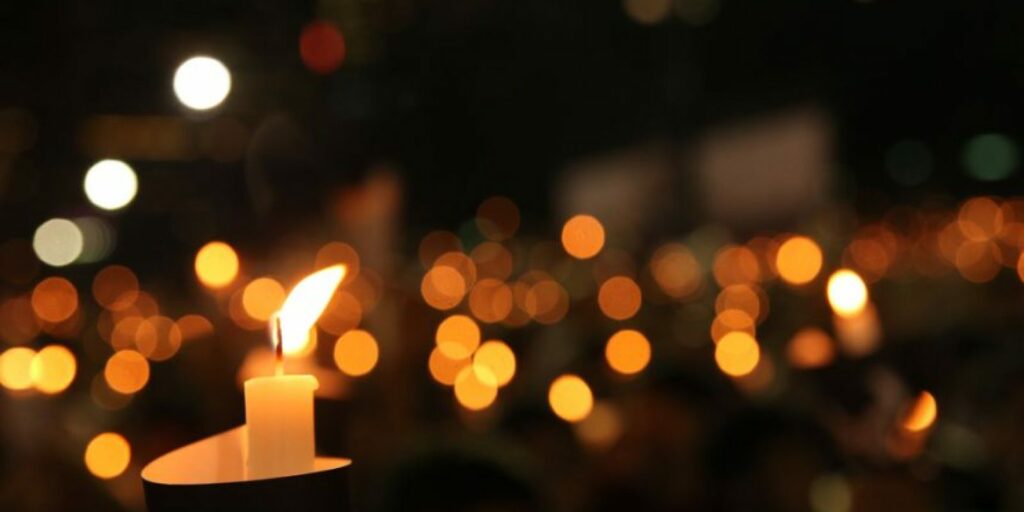
Inside there is a Lingam (or phallus) that represents the masculine energy or Shiva. Here lies sleeping Kundalini, the serpent coiled three times and half around the Shiva Lingam.
The three laps that Kundalini makes symbolize the 3 Gunas or qualities of nature: Tamas, Rajas and Sattwa. The half turn symbolizes the potential for transformation that lies in all human beings.
3.2- Number of petals, Bija Mantra and the representations of the first Chakra Muladhara
Bija Mantra (seed sound): LAM.
This sound stimulates, cleanses and activates the first Chakra Muladhara.
Color: Red or earth yellow
Number of petals: 4 petals with their own Mantras.
Muladhara Yantra: Circle with an inner square, representative of this Chakra. A crescent moon crowns the phallus and symbolizes the Divine Source of all energy.
Deity: Brahma (God of creation) riding Hamsa, the swan. Ganesha is also a deity associated with Muladhara.
Symbolic animal: The seven-trunk elephant Airavata.
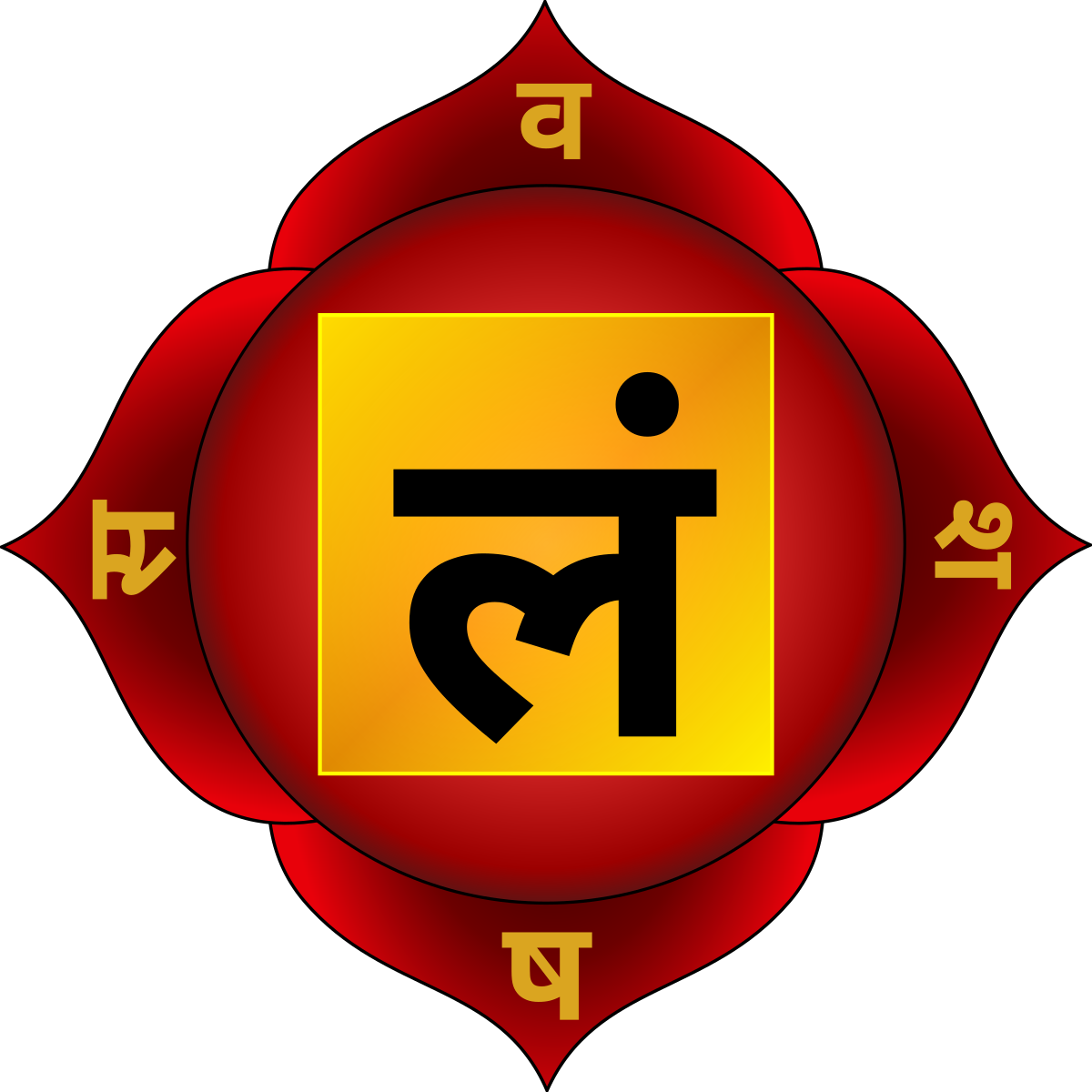
4.- Food and psychology of the first Chakra Muladhara
4.1- Food to harmonize Muladhara Chakra
When this Chakra is out of harmony, there is a tendency to eat strong and spicy foods, to drink alcohol, and to eat processed food that is kept with preservatives. To harmonize this Chakra it is necessary to purify yourself, reducing the consumption of fats and additives.

4.2- Psychology of Muladhara Chakra
It is the Root Chakra, which connects us to the earth and nourishes the physical body. It makes us feel rooted. It keeps us grounded (otherwise we’d fly). Its harmony brings solidity, security, satisfaction, stability, inner strength, and allows us to finish the things we started.
Muladhara is the link with everything feminine and with the development of life.
Reality is based on matter, on the concrete. The projects carried out are necessary, without being surprised by idealism (which paralyzes us).
The first Chakra marks us a tendency to seriousness, to the wisdom of acting in a concrete way. The earth becomes a safe place.
4.3- Psychological disharmony
The psychological disharmony in this Chakra manifests itself with the following symptoms:
– Eating quickly or compulsively is a behavior that comes to compensate for latent aggressiveness. We need constant stimulation (food, alcohol, etc.) to maintain a high level of physical and mental stimulation.
– Sadness, depression, low self-esteem, insecurity. These symptoms also indicate a childhood with little love from parents, notably in unwanted children.
– Conditions such as anorexia or bulimia, obesity, poor digestion, constipation, hemorrhoids, knee injuries, sciatica or degenerative arthritis have to do with the disharmony of Muladhara.
Generally, the awakening of Muladhara is accompanied by itching sensations around the coccyx and by the improvement of the sense of smell, which becomes so acute that unpleasant odors are difficult to bear.
5.- The first Chakra Muladhara and the need for expression
5.1- The awakening of Muladhara Chakra
All passions are stored in Muladhara. All guilt, every complex and frustration is rooted here.
Our life and actions are controlled by desires, and whatever we do is an expression of this lower Chakra.

All schizophrenics, neurotics and insane people who are burdened with guilt and complexes are people who have not been able to balance this Chakra. As a result, their lives are unmanageable and they live in a continuous state of agony.
It is essential to understand the relationship between our mental states and the disharmony of the Muladhara Chakra.
5.2- Control frustration and satisfaction
Unless this Chakra is purified, its quality of mind will remain tamasic and the result of our actions is usually frustration.
An example is sexual experiences, which are not a sin, on the contrary, they are sacred. Consciousness must awaken and the purpose of the sexual act it must be transmuted, to transform frustration into satisfaction.
We have to understand that the purpose of the sexual act has three components, which depend on the mental quality (Guna) of the individual: for a sense of procreation (Tamas), another purely for physical and/or mental pleasure (Rajas) , and a third to reach altered states of Consciousness (Sattva).
In a spiritual sense, we should not care about procreation or the satisfaction of our passions, only getting to connect with this deep spiritual experience. We must not forget that passion is important for the energy to sublimate and reach the upper Chakras, since Samadhi occurs in the seventh Chakra.

Yoga is not a path of renunciation where one has to abandon sex or physical experiences, only transform their purpose and meaning. The most serious mistake that the human race has made for thousands of years has been to give up their Consciousness. We can make the mind completely free.
6.- Asanas for the awakening of the first Chakra Muladhara
For the activation of the first Chakra we recommend the use of a suitable incense, as an example this natural incense from Goloka first Chakra.
The proper asanas to activate the first chakra are as follows:
Dandasana (the staff)
Tadasana (standing)
Samasthiti (balance on tiptoes)
Utthanasana (down and up)
Avasastikasana (squatting)
Utkatasana (yogic chair)
Navasana (the ship)
Vajrasana (diamond)
Vriksasana (the tree)
Anantasana (lying push-up)
Siddhasana (perfect posture)
Urvasana (thigh toning)
Padmasana (the lotus)
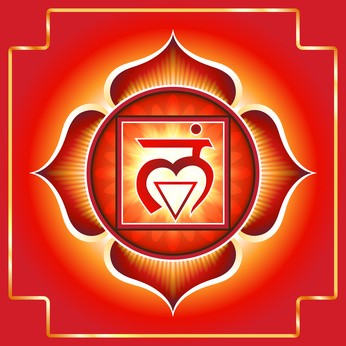
7.- Practices for the awakening of Muladhara Chakra
Muladhara is the easiest Chakra to awaken. There are many ways to wake it up, but the simplest, easiest and most controllable is Nasikagra Drishti (the concentration at the tip of the nose). This is because part of the sensory cortex that represents the Muladhara Chakra is connected to the nose. Also because this Chakra belongs to the earth element, which is directly related to the sense of smell.

The order of practice is: minimum 3 Asanas, Pranayama, Mudra (Nasikagra Drishti), Bandha (Mula Bandha) and ending with relaxation. If you are short on time do just Nasikagra Drishti and Mula Bandha.
8.- Sequence of Asanas to awaken the first Chakra Muladhara
8.1- Dandasana
The cane or right angle. It serves as preparation for some postures, mainly torsions and pincers. When you already have the posture, you visualize how the energy rises from the perineum to the crown. We can add the Bija Mantra and Nasikagra Drishti. To finish, relax and bring awareness to Muladhara.
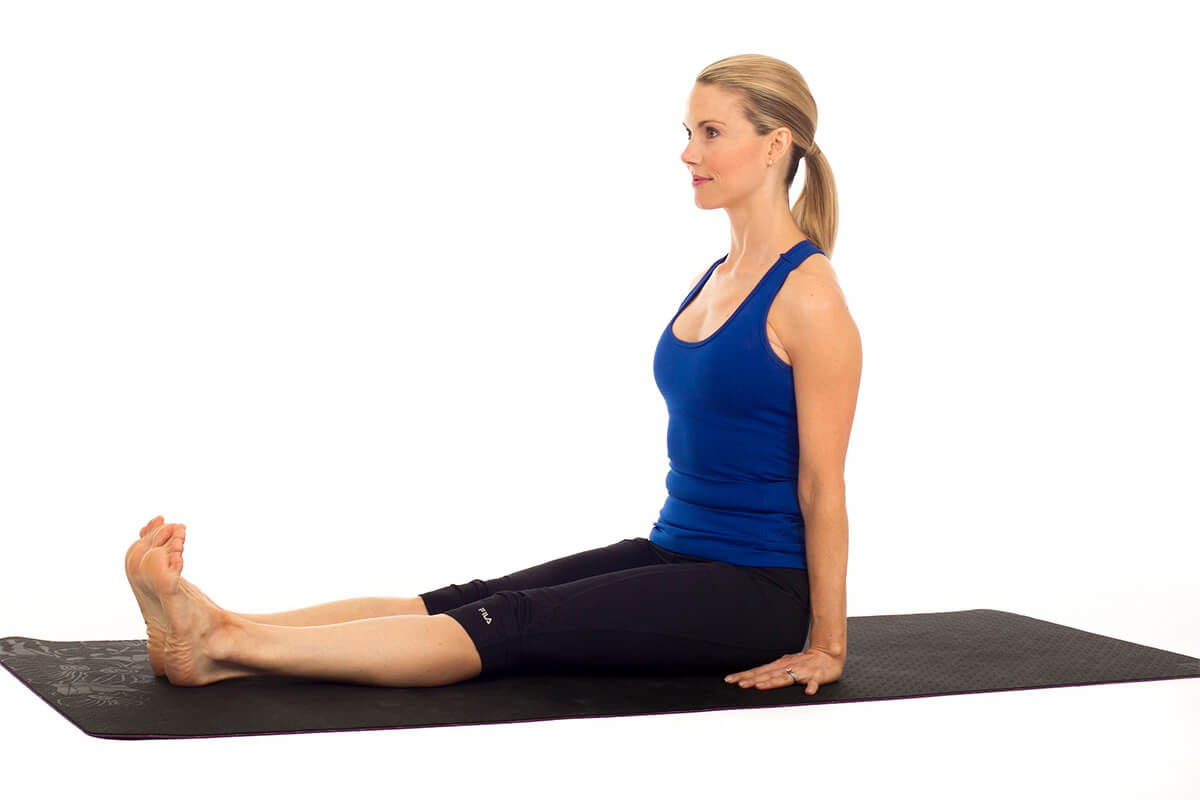
8.2- Tadasana and Samasthiti
Standing posture. We imagine some roots that penetrate the earth, and through them we nourish ourselves with this element nourishing Muladhara. Relaxed top. Increasing intensity from waist down at this lower level. Slow deep breathing. Static. We work the first Chakra in a dynamic way. Consciousness in Muladhara.
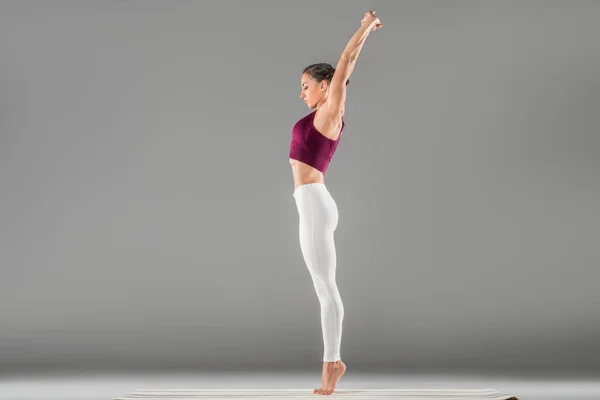
8.3- Garudasana
The Eagle. Fix your eyes on a point on the horizon. The more you twist with the other leg, the more you close the perineum. The more youwpml_nbsp twist with the other leg, the more you close the perineum. If we start holding on the right leg, the right arm also holds the left. There is a little bending of the knees. Hands touching and face to face. The two thumbs touch Ajna (Brow Chakra).
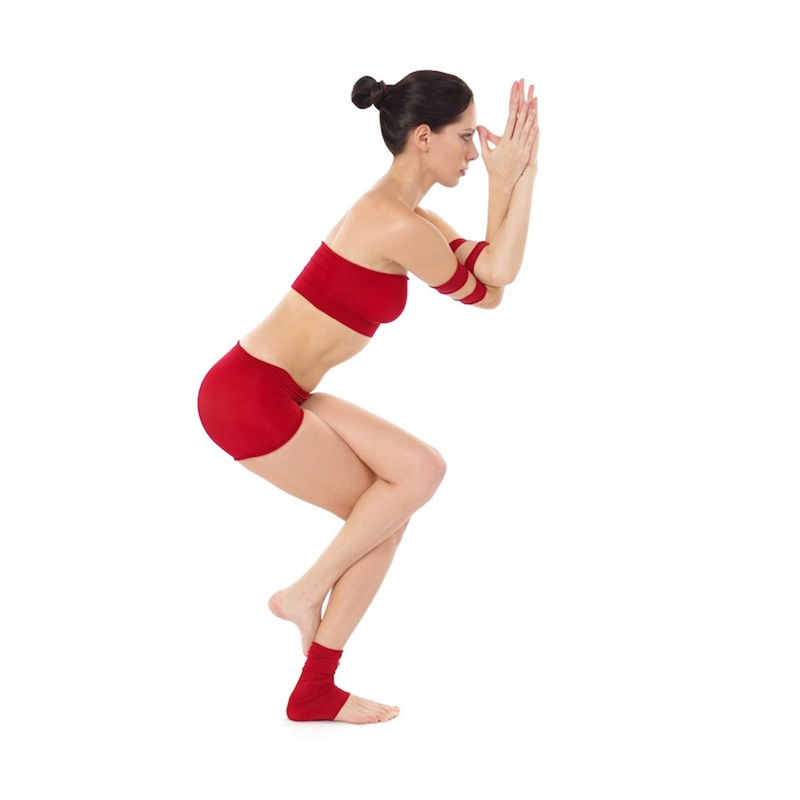
As a result, this posture closes our perineum and we accumulate the energy there.
8.4- Utthanasana
Lower and raise the body. Feet wide apart and open. Fingers and hands intertwined in front of the body with the arms relaxed, with lumbar rectification. Gaze at the horizon.

When exhaling we bend the knees and descend with the body straight, when exhaling we stretch the legs. Repeat it gradually lowering and without lifting your heels. To finish we stayed a few moments in knee bending.
8.5- Avasastikasana and utkatanana
Feet shoulder-width apart, with hands in Namasté and thus squat down.
The yogic chair: Feet apart, raise the arms laterally with the palms facing up to the vertical line. Bring your hands together over your head or leave your arms vertically parallel. Bend the legs with the knees in external rotation and slightly tilting the trunk forward without lifting the heels. Keep your head up next to your arms and your shoulders relaxed.
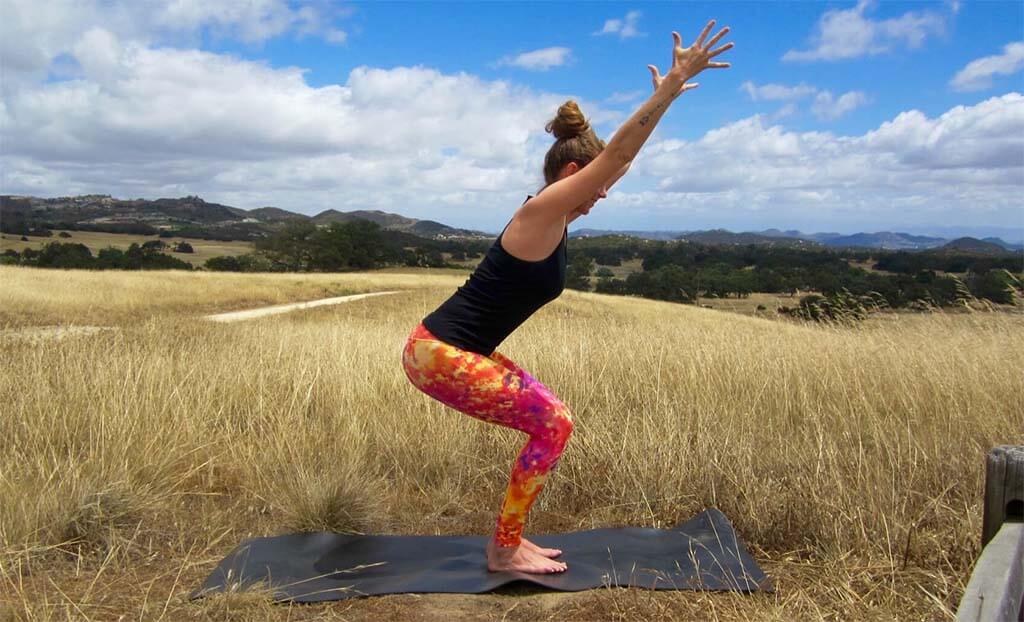
8.6- Navasana
It is the posture of balance on the sit bones. If you suffer from coccyx problems, it is advisable to use a cushion as support at the base of the spine.
We start from having our legs crossed and we will accentuate the balance. From here we can go up raising our feet leaving them in front of us (in front of the face). Consequently, you are becoming more and more entrenched in the land. The tips of the feet are more or less at eye level. To take the posture we move away from the feet, stretching the legs, leaving the arms parallel to the ground.
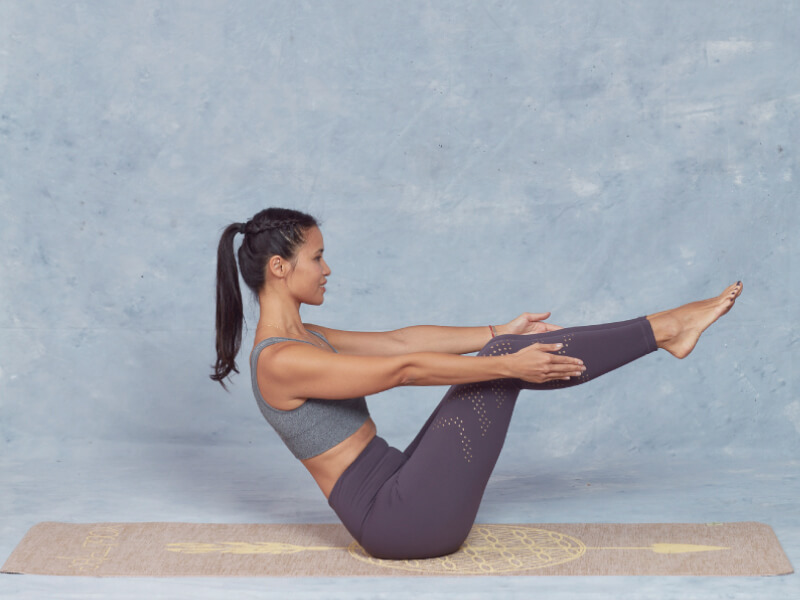
If you go too far back, the abdominal wall will suffer; if your feet are above your head, it will help you maintain your posture. You have to find your point. After this position you go down and we rest hugging the legs.
8.7- Vajrasana
The Diamond: Sitting on top of or between the heels; if you can’t, with cushions or sitting. Straight body. Inhale through the nose, bringing the energy down the front of the body to the perineum. Close sphincters and exhale by raising the energy through the spine.
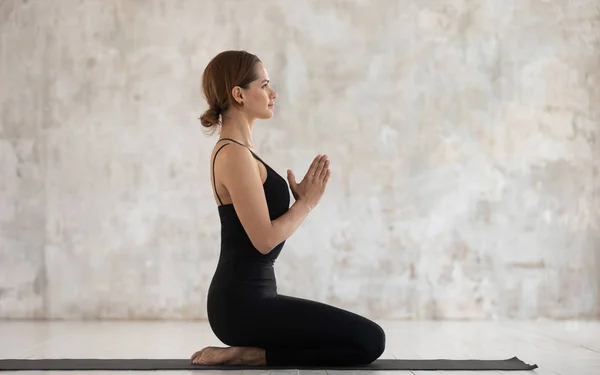
9.- The main practices for the first Chakra Muladhara
9.1- Samavriti Pranayama
The square pranayama.
1- We sit with our backs straight in a pranayama or meditation posture.
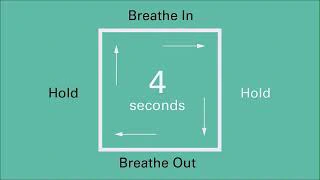
2- Once we are comfortable in the posture, we close our eyes and breathe deeply for a couple of minutes, without forcing or worrying too much about the technique.
3- We begin to do square breathing. We breathe in mentally counting to 3, we retain the air with full lungs counting to 3, we breathe out counting to 3, we retain with empty lungs counting to 3 and repeat the cycle again without interrupting it.
The key word of this technique is Balance. Balance of the nervous system, balance of the mind, calm and peace, plus the addition of oxygenating the blood and enhancing concentration.
By mentally counting the times, apart from matching the breathing phases, we are working on the concentration of the mind, because if we get distracted, we lose the thread and break the square.
9.2- Preliminary to Nasikagra Drishti
Preliminary: Before doing Nasikagra Drishti, we are going to do a preliminary exercise. Relax posture and if possible sitting in Padmasana (sitting in lotus), or alternatively Siddhásana (sitting in half lotus) with the spine and the straight head.
We hold the left arm with the thumb pointing up. We focus both eyes on the tip of the thumb. Bend your arm and slowly bring your thumb toward the tip of your nose, keeping your eyes focused on the tip of the thumb.
We keep the thumb on the tip of the nose for awpml_nbsp few seconds with the eyes focused.
We slowly stretch out our arm and continue looking at the tip of the thumb. We practice it 10 repetitions. Finally we close our eyes andstrong, wpml_nbsp rest. Breathing: inhale when the thumb moves towards the nose, exhale when we stretch the arm.
9.3- The start of Nasikagra Drishti
Nasikagra Drishti: relaxed posture and if possible sitting in Padmasana (Lotus), or failing that Siddhasana with the spine and head straight. Gaze at the tip of the nose. With your eyes open, you can see the double outline of the nose. These two lines converge at the tip of the nose forming the image of an inverted V.

Focus on the apex (tip) of the V. If you don’t see the solid outline of a V it means they are not fixed on the tip of the nose. At the beginning it seems difficult to hold attention on the tip of the nose for a few seconds. When you feel any discomfort, relax the position of your eyes for a few seconds and then repeat the practice.
After a few weeks, when the eyes have adjusted, gradually increase the duration of the practice. End the practice by covering your eyes with your palms to relax and energize them.

9.4- Mula Bhanda or the contraction of the perineum to activate Muladhara Chakra
We want to awaken the energy of the base, which evolves until it reaches the head. The genital apparatus benefits a lot from this exercise, also the rectum.
The technique consists of applying more or less intense pressure to the muscles of the perineum.
One technique is to sit with heel pressure in the space between the anus and the genital organ. Relax your body and close your eyes. We feel our breath inhaling and exhaling through the point at which we feel the pressure of the heel. Take 10 deep breaths with small contractions as you inhale. Then it’s about bringing attention to the coccyx, more or less about 3 cm inwards and under the spine.
10.- The levels of exercises to manifest Muladhara Chakra
• Exercise Level I: CONTRACTION WITH BREATH HOLD. Sitting, close your eyes and relax your body. Inhale deeply, hold your breath and contract the muscles of the Muladhara region. Pull your muscles up as much as you can, without exerting too much effort. Hold that contraction for as long as you can. Then relax your muscles and exhale. Practice for a few minutes daily.
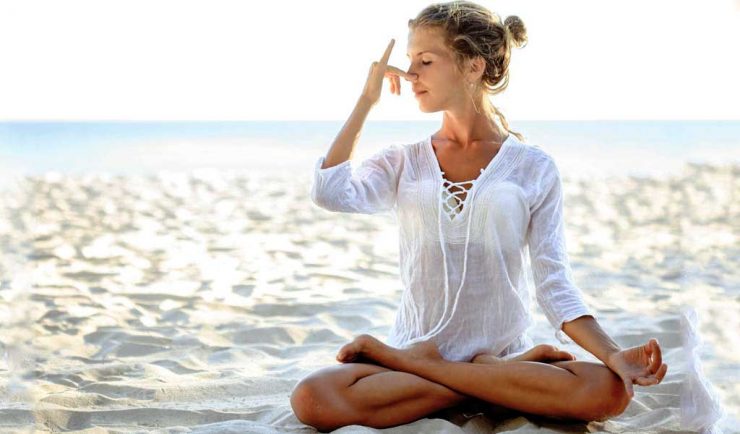
• Exercise Level II: THE PULSE. He contracts and relaxes Mula Bandha in a rhythmic manner. More or less, one contraction per second or at the speed of the heartbeat until we can finally stop doing the contractions and still continue feeling the beat in the area. Check that the contraction is happening at the point of Muladhara. Direct all your attention at the point of contraction. Practice for a few minutes daily.
11.- Location of the Muladhara Chakra
Press with the heel of the foot the space of the perineal muscle that remains between the anus and the testicles. For 5 minutes, imagine that you are inhaling and exhaling through the point at which you feel pressure from the heel. Mentally repeat “muladhara, muladhara, muladhara”.
12.- Relaxation and Pranayama
12.1- Breathing
Breathing is the most important process in the body. It influences the activity of each of the cells, and, the main thing, is intimately related to the functioning of the brain. Breathing activates the consumption of oxygen and glucose, producing the energy that enables muscle contractions, glandular secretion and mental processes. Breathing is closely linked to all aspects of the human experience.

Most people breathe strong, incorrectly, using only a small part of their lung capacity. Being this very superficial, depriving the body of oxygen and Prana essential for good health.
Most people breathe incorrectly, using only a small part of their lung capacity. Being this very superficial, depriving the body of oxygen and Prana essential for good health. Slow, deep, rhythmic breathing stimulates and is stimulated by calm, pleasant states of mind. Irregular breathing alters the rhythms of the brain and leads to physical, emotional and mental blockages, which in turn produce internal conflicts, personality imbalances, lifestyle disorders and diseases.
12.2- The Pranayama
It is generally defined as “breath control”, although it is much more complete than that. The word Pranayama is made up of two roots: “Prana” and “Ayama”. Prana means “vital energy” and although it is closely related to the air we breathe, it is much more subtle than air or oxygen. Pranayama uses the breath to influence the flow of Prana through the Nadis or energy channels.
The word “Yama” means control and is used to designate a series of rules or codes of conduct.
The word “Ayama” is more complete and profound, which is defined as “extension or expansion of the dimension of Prana“. In pranayama we use 4 times: inhalation, air retention with full lungs, exhalation and air retention with empty lungs. The most important part of pranayama is actually the Kumbhaka or empty breath retention.
